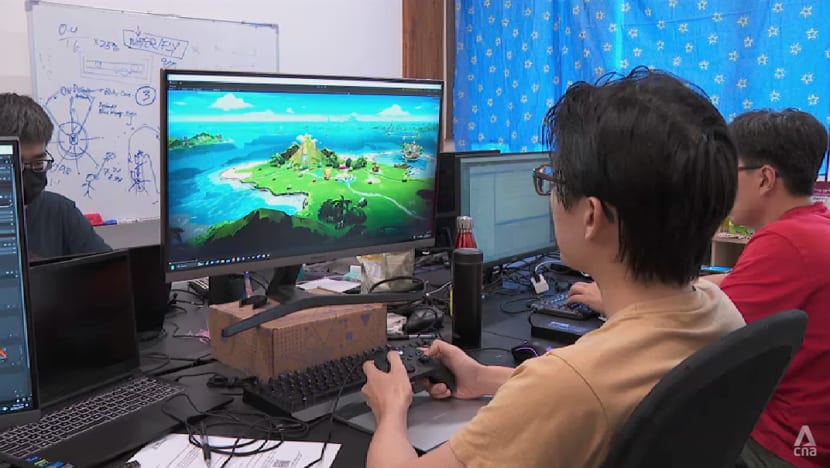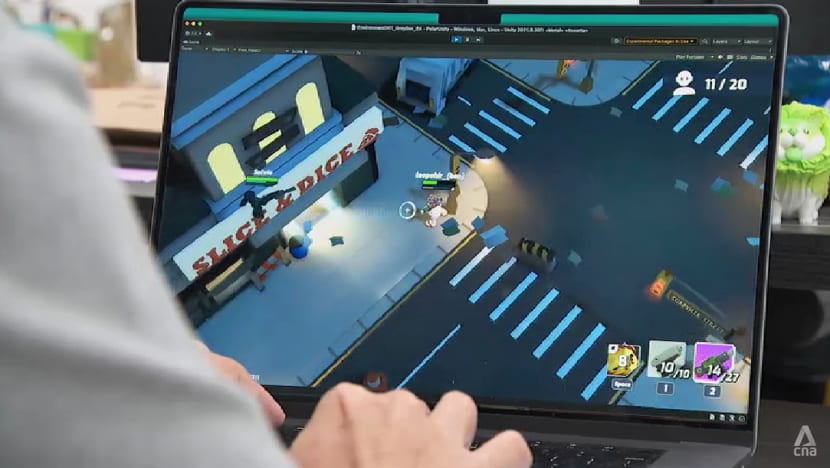Local gaming developers call for more support to ease talent and funding crunch
Singapore offers a gateway to the growing market in Asia, but experts said there may be some more levelling up to do to get a slice of this pie.

Singapore offers a gateway to the growing market in Asia, but experts said there may be some more levelling up to do to get a slice of this pie.

This audio is generated by an AI tool.
SINGAPORE: Local game developers in Singapore are calling for more support, as the talent and funding crunch is slowing their growth and expansion plans.
This comes as the government commits to investments in talent development and growing businesses in the gaming and e-sports industry.
The gaming and e-sports industry in Singapore has plenty of potential, with video game revenues in Singapore expected to grow at an annual rate of 14 per cent between 2023 to 2027, according to research firm Statista.
The country offers a gateway to the growing market in Asia, which houses over half of the world’s gamers.
However, experts said there may be some more levelling up to do to get a slice of this growing pie.
LABOUR WOES, FUNDING ISSUES
Local game developer The Gentlebros said making any new content or expanding to other markets will require more manpower, which it cannot afford.
The video game studio, which started in 2015, is behind Cat Quest, an award-winning role-playing game where a player assumes the role of a cat and goes on a quest to save the world.
Mr Desmond Wong, CEO of The Gentlebros, said “the video game industry as a whole is a pretty risky business”.
“Most developers are probably one or two video games away from closing if a game isn’t successful,” he added.
“So if you don’t have a hit, if you don’t have success, usually it’s pretty hard to continue running that business.”
In Singapore, it is also tough operating with the rising cost of living and the high cost of hiring staff,” said Mr Wong.
“We also have a lot of bigger companies… that also are able to pay really well for staff and employees, and that kind of jacks up the cost to hire in Singapore, which makes it doubly hard to grow and expand.”
Mr Wong said smaller studios like his try to offer workers a greater sense of involvement in their products and competitive salaries to make it “a more attractive place to work”.
Another game maker, Mighty Bear Games, is facing a similar problem.
Since January this year, the firm has been looking to fill positions for engineers, artists and project managers with more than three years of experience.
However, hiring talent is difficult, as those with the necessary skill sets would rather go to multinational companies (MNCs), said the game developer.
“The Singapore government has a good track record of attracting MNCs to Singapore and they provide them support as well. This makes it very difficult for local studios to compete, because they don't get access to the same kind of support,” said Mr Fadzuli Said, co-founder and chief technology officer at Mighty Bear Games.
“On top of that, MNCs prefer to hire experienced talents and forgo training the junior talent pool. This extracts a lot of value from the ecosystem and puts a lot of pressure on smaller companies to do the training.”
There is a need for homegrown studios to be better supported for Singapore to have “a resilient and sustainable gaming economy”, he said.
“My main concern is the impact on the gaming ecosystem if major MNCs were to decide to withdraw from Singapore.”

MORE SUPPORT NEEDED
To help them compete on the same footing as larger studios with deep pockets, local game developers said there needs to be a level playing field and government support needs to be focused on easing labour and funding issues.
“We have a shortage of senior level talent required to train the local talent pool,” said Mr Fadzuli, calling on the government to relook work pass rules.
“We should also relook at dependents' eligibility for work, because local companies will find it difficult to sufficiently compensate foreign talents.”
Mr Wong added that there could be more government grants and subsidies made available to help local companies grow and support their staff salaries.
“The government could also help local companies go overseas to attend certain trade shows, because trade shows are really great for fostering business partnerships (and) meeting new contacts from overseas,” he noted.
“On top of all that, helping local studios foster business relationships with companies of other industries can be immensely helpful as well. So for example, bridging the gap between a game studio and a merchandising company could be very beneficial for both,” he said.
To grow the local gaming scene, it is important to not just attract big companies here, said Mr Wong, adding that there should be enough support for local firms to expand so that talented individuals can “feel comfortable and motivated to actually come out and start something on their own.”
Observers stressed that local gamers have a part to play, starting with buying products made in Singapore.
“Most of our fans in Singapore support overseas teams,” Mr Roy Kek, co-founder and CEO of Singaporean gaming and e-sports company EMERGE Group.
“They support the larger game developers as compared to their local game heroes and one of the key things, in order for the entire industry to grow, (is that) your local heroes need your support.”












.png?itok=wlyeDwqW)







